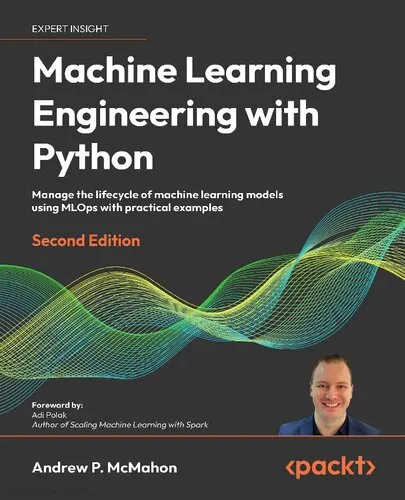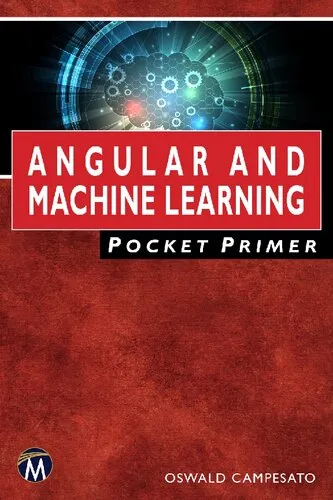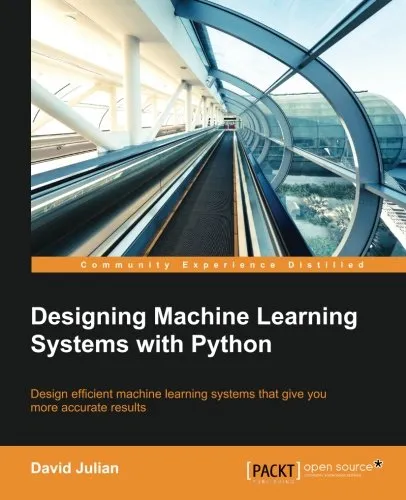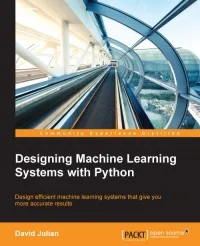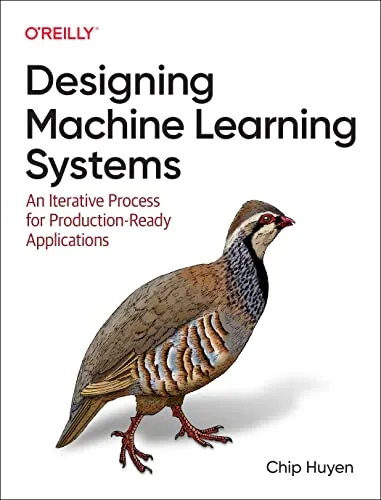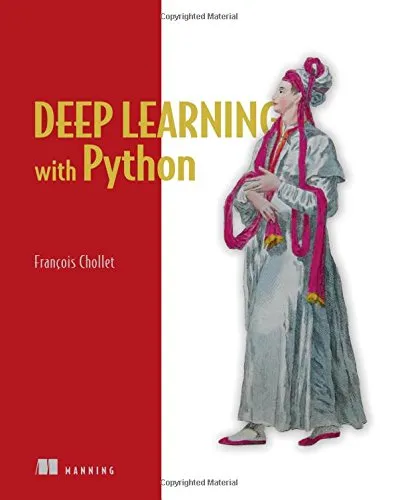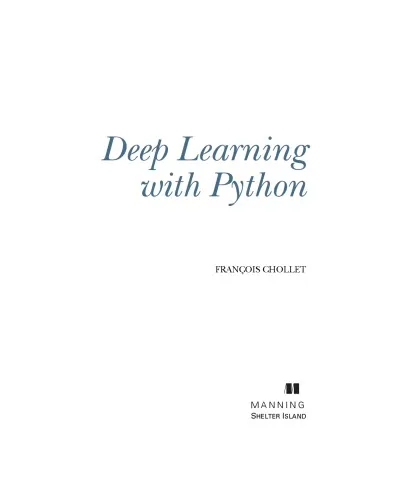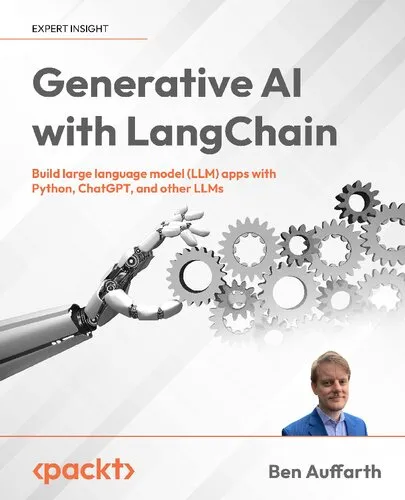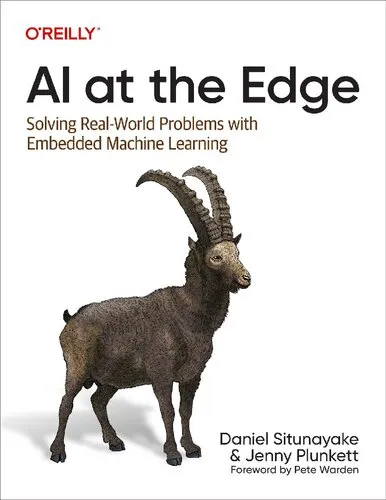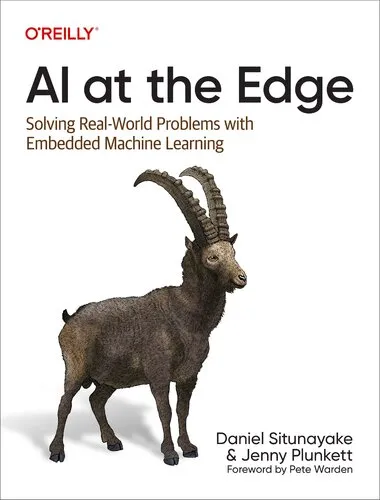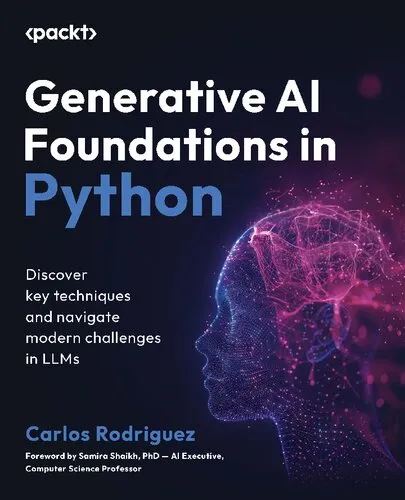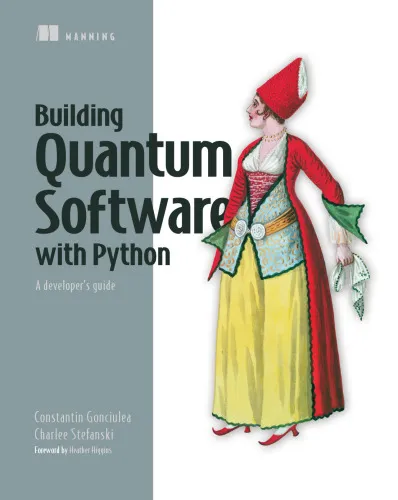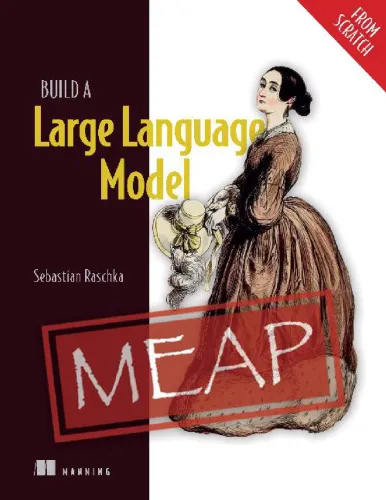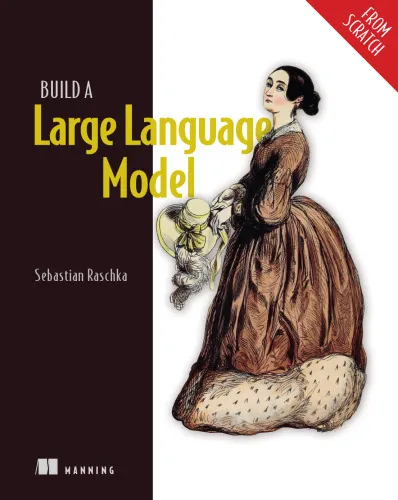Machine Learning Engineering with Python: Manage the lifecycle of machine learning models using MLOps with practical examples
4.4
بر اساس نظر کاربران

شما میتونید سوالاتتون در باره کتاب رو از هوش مصنوعیش بعد از ورود بپرسید
هر دانلود یا پرسش از هوش مصنوعی 2 امتیاز لازم دارد، برای بدست آوردن امتیاز رایگان، به صفحه ی راهنمای امتیازات سر بزنید و یک سری کار ارزشمند انجام بدینکتاب های مرتبط:
خلاصه تحلیلی کتاب
کتاب «Machine Learning Engineering with Python: Manage the lifecycle of machine learning models using MLOps with practical examples» اثری است که کلیت مفهوم مهندسی Machine Learning را از نگاه عملیاتی و زیرساختی بررسی میکند. این کتاب با ترکیب دانش تئوری و مثالهای عملی، فرآیند طراحی، توسعه، استقرار و نگهداری مدلهای ML را بهصورت گامبهگام نشان میدهد. تمرکز نویسنده، بر ایجاد انسجام بین تیمهای داده، توسعه و عملیات است تا از طریق MLOps بتوان بهرهوری و کیفیت سیستمهای مبتنی بر هوش مصنوعی را افزایش داد.
این اثر نهتنها برای مهندسان نرمافزار، بلکه برای محققان داده، کارشناسان DevOps و تصمیمگیران حوزه فناوری، منبعی ارزشمند است. ساختار محتوایی کتاب به گونهای است که خواننده، در هر بخش، علاوه بر درک مفاهیم، با پیادهسازی آنها در محیط عملیاتی نیز آشنا میشود. نویسنده با استفاده از Python و کتابخانههای تخصصی، پل ارتباطی میان توسعه مدلها و مدیریت آنها در شرایط تولید (Production) ایجاد کرده است.
نکات کلیدی و کاربردی
یکی از برجستهترین ویژگیهای این کتاب، تمرکز بر MLOps بهعنوان رویکردی ساختاریافته برای مدیریت چرخهعمر مدلهای Machine Learning است. خواننده با ابزارها و روشهایی آشنا میشود که امکان مانیتورینگ، بهروزرسانی و بهینهسازی مدلها را با کمترین اختلال فراهم میکند. مفاهیم Continuous Integration و Continuous Deployment برای مدلهای ML، به زبانی روان و عملی توضیح داده شدهاند.
علاوه بر این، کتاب به چالشهایی مانند Drift داده، نیاز به بازآموزی مدلها، و مسائل مقیاسپذیری پرداخته است. تمرینها و مثالهای موجود به متخصصان این امکان را میدهد که مفاهیم را به پروژههای واقعی خود تعمیم دهند. این اثر همچنین به امنیت و مدیریت ریسک در پروژههای هوش مصنوعی توجه ویژهای نشان میدهد.
نقلقولهای ماندگار
این کتاب دربرگیرنده نکاتی است که ارزش تکرار دارند؛ جملاتی که عمق فلسفه مهندسی Machine Learning را بیان میکنند و الهامبخش خواننده در کار عملی خواهند بود.
«یک مدل بهتنهایی هوشمند نیست؛ هوشمندی واقعی زمانی بروز میکند که مدل، داده و زیرساخت در هماهنگی کامل عمل کنند.» نامشخص
«MLOps پلی است میان ایدههای علمی و نیازهای صنعتی؛ بدون آن، مدلها در خلأ باقی میمانند.» نامشخص
چرا این کتاب اهمیت دارد
با رشد سریع کاربردهای هوش مصنوعی، صرفاً ساخت مدلهای ML کافی نیست؛ آنها باید در محیطهای عملیاتی پایدار، ایمن و قابل توسعه اجرا شوند. این کتاب، شکاف میان توسعه اولیه مدل و استفاده واقعی در سطح سازمان را پر میکند. رویکرد MLOps توضیح داده شده در آن، کارشناسان را قادر میسازد تا با چرخهعمر مدل بهصورت یک پروژه نرمافزاری کامل رفتار کنند. این دیدگاه برای پژوهشگران نیز حیاتی است، زیرا امکان انتقال یافتههای علمی به کاربردهای تجاری را فراهم میکند.
بهعلاوه، استفاده از Python در مثالها، امکان بازتولید و آزمایش سریع را فراهم میآورد و به توسعهدهندگان کمک میکند تا واقعیتهای پروژههای ML را بدون اتلاف منابع تجربه کنند. نویسنده با دانش عمیق و تجربه عملی، محتوایی ارائه کرده که میتواند مرجع روزانه متخصصان حوزه داده باشد.
نتیجهگیری الهامبخش
کتاب «Machine Learning Engineering with Python: Manage the lifecycle of machine learning models using MLOps with practical examples» فراتر از یک منبع آموزشی ساده است؛ این کتاب نقشه راهی برای عبور موفقیتآمیز از چالشهای واقعی در پیادهسازی و نگهداری سیستمهای هوشمند است. اگر شما بهدنبال ارتقاء مهارتهای خود در مهندسی Machine Learning و بهرهگیری از قدرت MLOps هستید، این کتاب
Analytical Summary
This book, “Machine Learning Engineering with Python: Manage the lifecycle of machine learning models using MLOps with practical examples,” serves as a definitive guide for data scientists, engineers, and researchers who aim to bridge the gap between prototype models and production-grade deployment. Drawing on industry-proven practices, it combines theoretical underpinnings, code-level clarity, and process-oriented thinking to deliver a resource equally valuable for academics, enterprise teams, and independent practitioners.
Rather than focussing solely on algorithmic theory, the text delves deeply into engineering considerations, detailing how to design, implement, test, deploy, monitor, and iterate machine learning models systematically. In doing so, it highlights MLOps — the emerging discipline that merges machine learning development with DevOps principles — as the core enabler of repeatable, resilient, and measurable machine learning outcomes.
Using the Python programming language as its primary tool, readers are led step-by-step through the full machine learning lifecycle. The narrative balances accessible explanations with technical depth, making it suitable both as a structured learning path and as an ongoing reference manual. Authoritative and grounded, the book’s guidance stems from widely accepted best practices, reinforced by clear practical examples and illustrative workflows.
Key Takeaways
By the end of the book, readers will gain a comprehensive understanding of the strategies, tools, and methodologies required to manage the applied lifecycle of machine learning systems effectively.
Essential takeaways include:
- A clear framework for integrating MLOps practices into existing data workflows.
- Detailed insights on how Python simplifies and accelerates machine learning engineering tasks.
- Techniques for robust model versioning, reproducibility, and monitoring in production environments.
- Practical approaches to collaboration between data scientists, machine learning engineers, and DevOps professionals.
- Guidance on selecting tools and services that align with both project goals and organisational constraints.
Memorable Quotes
“In machine learning engineering, the model is just the beginning; the system is the real product.” Unknown
“Operational excellence in ML comes from understanding both code and context.” Unknown
“Effective MLOps turns experimentation into production with confidence.” Unknown
Why This Book Matters
As organisations increasingly rely on data-driven decision-making, the gap between experimental machine learning work and operational deployment often becomes a bottleneck. This book directly tackles that challenge.
By embedding MLOps principles into every phase of model development, it provides professionals with the knowledge to maintain both velocity and quality as models evolve. Python’s versatility and widespread adoption make it an ideal companion in this journey, and the book’s examples showcase realistic patterns that can be adapted across industries.
For educators, the volume offers a curriculum-ready structure that encourages a holistic view: not just how to build models, but how to shepherd them responsibly in live environments. For practitioners, it delivers actionable guidance that can save time, prevent costly errors, and align teams around a common operational language.
Inspiring Conclusion
In “Machine Learning Engineering with Python: Manage the lifecycle of machine learning models using MLOps with practical examples,” the reader finds both a technical roadmap and a professional manifesto for responsible, scalable, and impactful machine learning in practice.
Whether you are an academic seeking a structured teaching aid, a professional intent on refining your production ML skills, or a researcher aiming to understand operational dynamics, this book provides the tools and perspectives to navigate the complexities of modern machine learning engineering. Clear, practical, and deeply relevant, it stands as a resource you can return to as technologies evolve and projects grow.
Read it, share its insights with your peers, and discuss its methods in your teams. The pace of the machine learning field shows no signs of slowing — and with the frameworks and practices outlined here, you’ll be positioned not just to keep up, but to lead.
دانلود رایگان مستقیم
شما میتونید سوالاتتون در باره کتاب رو از هوش مصنوعیش بعد از ورود بپرسید
دسترسی به کتابها از طریق پلتفرمهای قانونی و کتابخانههای عمومی نه تنها از حقوق نویسندگان و ناشران حمایت میکند، بلکه به پایداری فرهنگ کتابخوانی نیز کمک میرساند. پیش از دانلود، لحظهای به بررسی این گزینهها فکر کنید.
این کتاب رو در پلتفرم های دیگه ببینید
WorldCat به شما کمک میکنه تا کتاب ها رو در کتابخانه های سراسر دنیا پیدا کنید
امتیازها، نظرات تخصصی و صحبت ها درباره کتاب را در Goodreads ببینید
کتابهای کمیاب یا دست دوم را در AbeBooks پیدا کنید و بخرید
1316
بازدید4.4
امتیاز0
نظر98%
رضایتنظرات:
4.4
بر اساس 0 نظر کاربران
Questions & Answers
Ask questions about this book or help others by answering
No questions yet. Be the first to ask!
